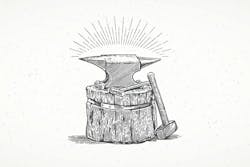Tom Ward started his shop the way many of us did. He had a passion for the industry, had a great work ethic and loved the work he did. Like most of us, Tom was deeply rooted in his community. He made sure that his customers had reliable and safe transportation. But as the years passed, it became harder and harder to keep up with the times. Tom had to make a tough decision to keep his business alive.
There’s something you should know about Tom: His shop was located in Cleveland and was founded in 1915. Tom was a blacksmith. His decision? To transform his shop from blacksmithing to auto repair.
The blacksmiths of the early 1900s saw their industry dramatically change. With automobiles quickly becoming the dominant means of transportation, the blacksmiths were faced with a decision—innovate or die. Many of those that adapted became our first auto mechanics. They were the ones that viewed themselves in the business of transportation, not just blacksmithing. Those that viewed themselves only as blacksmiths? Some did survive, but most didn’t make it.
Other companies in recent times disappeared in the same way. Smith Corona was a typewriter company established in the 1890s. In 1990, Smith Corona stated that they would never abandon their core product, the typewriter. Smith Corona went bankrupt five years later. Kodak continued to view themselves as a film company even as the digital world was passing them by. In 2013, Kodak also filed for bankruptcy. Like many of the blacksmiths of the early 1900s, these companies made the fatal mistake of defining their businesses by what they did or what they produced.
Today, independent automotive repair shops are faced with similar challenges. The transformation of the auto industry is like nothing we have ever experienced before. The changes I am referring to are not the same as the change from points and condenser to electronic ignition, or the change from carburetors to fuel injection. In comparison, those changes were nothing; a mere blip in the evolution of the automobile. The independent repair shops have always been able to adapt to changing technology. The changes I am referring to have more to do with how we are going to adapt to the world around us.
Companies such as Google, Amazon, Facebook, Uber, Lyft and others are literally changing the world. Ride sharing may be a buzzword now, but there is no doubt that it will catch on in urban areas. Self-driving cars and electric cars will eventually become mainstream. If all this sounds like it’s far into the future, it’s closer than you think.
But another challenge is happening right now. Repair shops can no longer take a reactive stance and wait for customers to drive their broken cars to our bays. While there will always be those loyal customers, the shops that are proactive with their marketing efforts will thrive in tomorrow’s business climate. That will mean clearly defining your profile customer, creating an amazing customer experience, doing all you can to maintain contact with those customers and ensuring they return to you for all their car care needs. It will also mean that will need to be active on social media and in your community.
Perhaps the most important question is, “How do we fit into this new marketplace?” And, “Who will our customers be?” The consumer is changing and we need to accept and be part of that change. The Internet has redefined how consumers shop, gather information and share their lives with their friends and the world.
“It will be the strong brand you create, which stands out in your community, that will be the difference maker.”
—Joe Marconi, Owner, Osceola Garage
We will need to take a long hard look at our business model and determine who we are and why we are in business. If we view ourselves as traditional repair shops, we will fall victim to the same fate as many other companies did that defined themselves by the work they did or the products they sold. Your shop will not be defined by your Snap-on tools, your Hunter alignment machine, or your OE scanner. Those are the tools you need in business to do the work you do—the same as the hammer and anvil were the tools of the blacksmith. But even the best hammer and anvil did not save the most qualified blacksmith. It will be the strong brand you create, which stands out in your community, that will be the difference maker.
Tom Ward’s shop remained in business until the late 1950s. He made the transformation from blacksmith to auto repair. He never forgot his trade and he fit the classic image of a tough, hardened blacksmith. But Tom realized that it was his ability to adapt to the world around him that led to a thriving business that would last for nearly 50 years
About the Author

Joe Marconi
Joe Marconi has more than four decades of experience in the automotive repair industry. He is the owner of Osceola Garage in Baldwin Place, N.Y., a business development coach for Elite Worldwide, and co-founder of autoshopowner.com.
